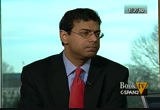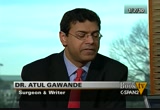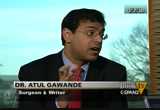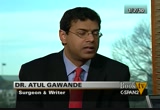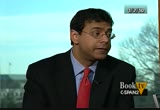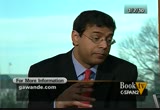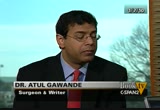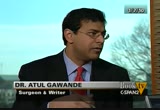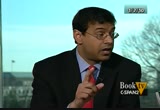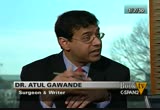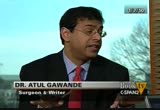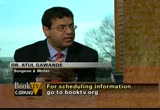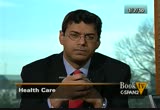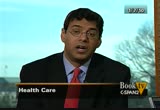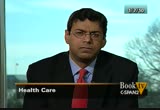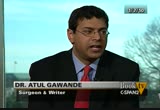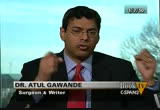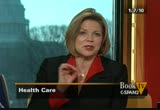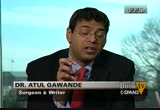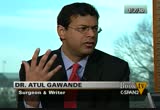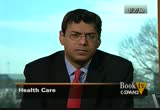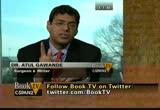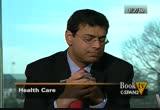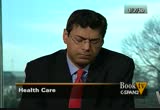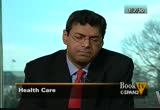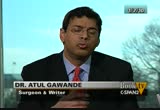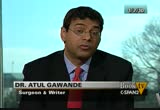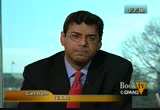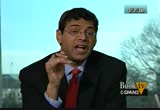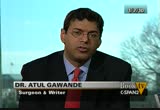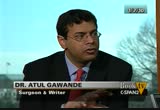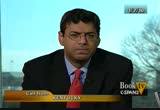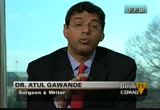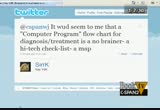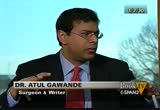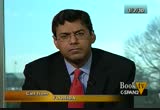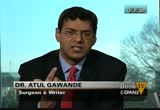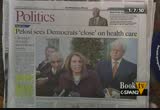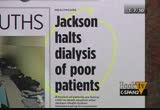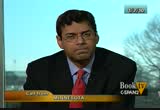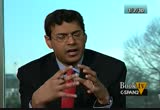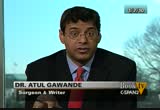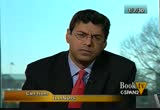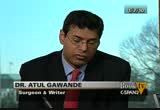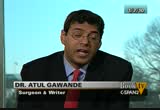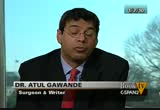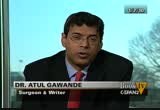tv Book TV CSPAN January 17, 2010 10:00am-11:00am EST
10:00 am
also be a dangerous place? >> guest: it was always understood by and many that hitler thought of palestine is a great big prison camp for the juice and then they could take over the middle east. but i think the zionist thought let's say the jews on monday and we will figure out what happens on friday. it has always been the jewish aspiration we do not want to be killed before chavez. . .
10:01 am
10:02 am
>> edwin black is the author of many books including ibm and the holocaust. war against the weak and internal combustion. he's the editor of the cutting edge news. for more information, visit transferagreement.com. >> something asple as a checklist can reduce complications in surgeries. this is an hour. >> we're going to introduce you to our final guest of the morning, dr. atul gawande, who is a surgeon he has also been does in the debate over public
10:03 am
policy on healthcare for a decade and a half now. he has in the past written a number of books including better a surgeon's note on performance, complications a surgeon's notes on an imperfect science and his latest book is called the checklist manifesto, how to get things right. we're going to talk to him about that. during the clinton years he served as senior health policy advisor during both the campaign and during the white house '92 to '93, and you can read him on a fairly regular basis in the new yorker so thanks to be here. >> great to be here. >> when did you make the decision that in addition to practicing you would also be involved in healthcare policy? >> guest: it was -- i tried to avoided being a doctor for a while. the son of two indian doctors you're naturally going to become a doctor yourself. and i wanted to push against my own inevitable path. and during a time i did a masters in politics and philosophy and then came to washington and worked forrim cooper, a conservative democrat
10:04 am
from tennessee. i worked on the al gore president way back in '88. and then in '92, i came back from the middle of medical school which became the thing i keep falling back to because i didn't like depending on working for other people to figure out what i really think and how i can contribute. >> host: well, let's get to the 30,000 view of healthcare in the united states. will you give us your view on the healthcare they have and a size of that how much it costs us to get it and how many people don't have access. >> guest: in many ways we have amazing cutting edge healthcare. and we have access to unbelievable technologies. and unbelievably well-trained people. and at the same time you can find some really abysmal healthcare with lack of access in poor communities right within
10:05 am
our own cities and neighborhoods. and that stark contrast is a major problem that we're struggling with. i'd say the second major problem we're struggling with is that the pieces don't fit together for any of us. the thing we're struggling with in health reform -- we have focused a lot on the insurance hassles and the insurance organization. but we missed the point that the deepest struggle here is with the complexity. science has given us 13,000 diagnosis that we've identified the problems the human body can sustain. 13,000 ways the human body can fail. for it we came out the last century with 6,000 drugs, 4,000 medical and surgical procedures and we're trying to deploy it city by city optimally in the right time and right place for people and we're having a hard time. >> host: is there a big fix for people? >> guest: this is the stark change of problems of cost and quality.
10:06 am
coverage providing insurance to the wide population of people who are missing it at 45 million, we had solutions on the shelf for 30 years now and we've been battling. is it public coverage or private coverage but whichever way there are solutions. when it comes to quality and cost, this is more a management problem. you never fix it all at once. and we've had this great frustration about the healthcare bill that, you know, where is the master plan for solving cost once and for all? and the reality is that in order to organize care more effectively, we know we have some fundamental problems. doctors don't work together. we're fragmented. and the incentives of the system where we're paid piecemeal fee for service have led to piecemeal care with overtreatment in certain sectors, undertreatment of problems where we have primary care and mental healthcare gaps.
10:07 am
and mistreatment, mistakes in care that happen all too frequently. >> host: the broad area agreement between the health and senate bills. have you come to a conclusion about whether or not what's -- what is moving along the track on capitol hill taking us in the right direction? >> guest: you know, my litmus test is are there tools here that we as clinicians working with patients would be able to use to make care better in our local communities. the coverage parts are ones that will mean that that 15% of our patients who come in the door and don't have coverage that's a constant battle. i'm a cancer surgeon. i spent years with struggling with what we're going to do about chemotherapy and radiation treatment with people who couldn't afford it them and when massachusetts passed its plane it suddenly disappeared as an issue.
10:08 am
we still have our struggles with some cost aspects for the patients. but that coverage part is there. the second part, though, is we really have not as a community of clinicians worked on how do we make care more consistent, more reliable and less wasteful? and for the first time i'm hearing people in our -- in our conventions, in our meetings and in our hospital organization trying to figure out if this bill passes, there's a lot in here to push us in the right direction. i'm hearing discussions i've never heard about what should we do about getting our costs down. >> host: we would like to invite you to take part in this conversation, questions and comments. many of you so involved in the healthcare debate and we've been talking about it a lot here but as the congress comes back to work, an opportunity for you to get engaged once again in the discussion with our guest. dr. atul gawande. we will take your calls. you can send us an email. you can also send us is twitter message if you'd like.
10:09 am
let me just -- one last question before calls ask you to tell us your views about the implications of the aging baby boomer generation both on the kinds of care people will be seeking and the country's ability to pay for it? >> guest: it's interesting that one worry people are voting about the healthcare bill if we're covering 45 million people where are we going to get the primary care doctors to help with that. the even larger issue is that over the next 15 years or so, the population over 65 is going to double. which means that the number of breast cancers, colon cancers, heart attacks are going to nearly double. our work force for manage aing those problems is not going to get bigger. and we have not been thinking through how we organize ourselves to handle a larger population of people with more complex needs and not as many people in the system. we're thinking, let's hire more, hire more. let's spend more, spend more, spend more. and i think there's every sign we can make safer, higher
10:10 am
quality care and organize ourselves better in ways that we can handle that problem without expecting, you know, 50% of americans to become doctors. >> host: well, how does that get implemented? how does it break into this system as an idea that's acted upon? >> guest: let me give you a small example. asthma care -- i was talking at children's care hospital recently and one thing they finally decided to do was organize themselves to make sure you get the right steps in asthma care for everybody and they did it by implementing this checklists this counterintuitive idea. they made sure things that happened for each patient. they found that you tackled things like making sure you had calls to keep them on inhalers and so then. -- so on. their admission rates fell over 80%. guess what their number one revenue source was, asthma admissions for children's hospital and they found they were losing millions of dollars under reform for the first time you're seeing let's pay a package -- for a package of care
10:11 am
where we're paying for those great results rather than extra money for every time you bring a kid into the hospital. and as we begin doing that, we're seeing hospitals talking about how to organize care so we actually become more efficient. and get better results for people. it is going to be a real turn in how we think of ourselves as doctors, nurses, and others working on problems. but it's the kinds of experiments that we have to be taking sellers. -- seriously. >> host: buffalo, you're on the air. >> caller: good morning, susan. doc, what i want to talk to you about and susan, too, i got to meet her. it's kind of fun. senator coburn was on your show -- it's been a month or two ago. and he was talking about running all these tests that he knew was
10:12 am
unnecessary, but he had to do it for his liability, whatever. now, is that not waste, fraud and abuse? if i would do something like that, i would be in jail. and i know there's other doctors that do this. now, i'm 63. i'm in the va system. they control my copd, my high blood pressure and everything. it doesn't cost me a dime. i could be on medicare but i chose not to do it. i've been with the va since i got out of the service since '71. but why are all these tests being run and i know it cost money. >> host: thank you, dean. in fact testing and how much doctors has been a regular theme. here's one headline article, testing, testing, testing and how doctors are calling for a lot of tests they sometimes they
10:13 am
say are gold plated more than they need? >> guest: your caller did hit the button which is our malpractice system which is driven in ways -- so let me give you an example. headaches, one community actually trade to look at how many ct scans in cedar rapids iowa they were doing for people. they found they were doing 52,000 ct scans. all of us know this isn't necessary. and 10,000 of them were for head ct scans. only a tiny number ended up turning it up any abnormallity. many of them were just headaches. and a more significant part of it is that we don't -- we have not really established what our process is, our appropriate guideline for care for handling the headache so that we can do it the right way and so we have
10:14 am
tens of thousands of unnecessary ct scans that actually are causing more harm because we have radiation exposure and we're seeing increasing in cancer likely to appear over the next 10 to 15 years. and so this situation is not going to be solved entirely by malpractice reforms. and one frustration is not seeing that part of the components of the package. but it is out of leading communities to begin looking at their numbers and finding ways to drive down their use of these scans. and we found communities that are doing it even without malpractice changes. are able to dry high quality and lower cost care and avoid overtreatment. . >> host: is malpractice the primary driver or the scenario you described earlier which people make money off the tests? >> guest: one of the interesting things as i wrote an article for the new yorker in june last year when where i looked at two communities in texas where there
10:15 am
was malpractice reform. after substantial malpractice reform there's not been a dampening down of the costs. when you compare two communities, two counties on the border that had very similar health populations, they had one community spending twice as much money for healthcare as the other. and what you saw was business incentives and home care agencies and others that had cropped up to take advantage of the insurance system. and you saw really fragmented disorganized care where doctors had not organized to make sure we were taking care of the good primary care up front, avoiding overtesting. even more you saw two to three times as much surgery in that population. as a surgeon, we rarely are doing surgery just to protect ourselves from a malpractice suit. instead you have gray zones. you have a patient with a gallbladder attack. do you watch it to see if there are more attacks or do you take
10:16 am
out the gallbladder at that first attack? the textbooks say you wait. but when you make no money watching and you make some money -- significant dollars by doing the operation there is that tension between the business need and the patient need and we see it playing out in different ways across communities in the united states. >> host: jamesville, wisconsin is next. this is scott on our independent line. good morning, scott. >> caller: good morning. i have a question of efficiency and automation. is it possible that we could -- i know that there's a lot of advancements in surgery and things. and is it possible that we could have a loss of jobs because our medical system gets so efficient like what happened in industry
10:17 am
of working class people, you know, fabrics, automotive, woods and things like that? is that a possibility that could happen? >> it is. it's actually -- the move towards our being more efficient, we can have lots of people who are digging ditches. and we can hire more people to dig ditches and fill them back up but if they're not providing value then it actually doesn't help our economy. and in a similar way in healthcare, if we are moving more and more the labor force into that sector of our economy, it means we are not able to grow many other parts of the economy. and so the places where that we're going, we're far from a world -- one of the striking things is in the last -- in this recession, healthcare is one industry where it has continued to agree in employment. we've expanded spending and healthcare over 130% over the last 10 years.
10:18 am
and a lot of it has been in middle men in the system. without necessarily getting you more time with your doctor. and that is one of the bizarre parts here. it's why in my unexpectedly for me i ended writing a book in healthcare because solving these problems is really about saying we're going to be much more disciplined and organized about how we provide care. i designed with my team a surgical checklist with the world health organization. that's a 2-minute check to make sure there are 19 things we get right in every operation and i was stunned to see in 2 out of 3 cases before we brought it in, patients had 1 of those key lifesaving steps missing for them. we then implemented it in eight hospitals. we saw -- in 8,000 patients we reduced the complication rates by 35% and the savings from this kind of program, which we deployed in 8 cities is massively more than anything we would invest in it.
10:19 am
but we're -- we don't work on these kinds of organizational problems in medicine partly because the incentives haven't been there. partly because we as experts don't think of these as the kinds of problems to work on. . >> host: next question is from illinois. this is andy on the republican line. you're on, andy? >> caller: first i want to chastise most of the callers. they call up how you're feeling this morning or how you're doing this morning. and, you know, you answer it once at 6:00 in the morning. and you don't have to answer it anymore, i don't think. it's crazy that callers do that. the reason we've got the best healthcare in the world is because we spend so much on it. and we just spend it the wrong way. what we should do is we need to specialize -- you know, when i need a gallon of milk for the best value and probation violation for my money but when i break my leg, you know, i don't know where's the best value that i can go for my money?
10:20 am
now, what we need to do is promote the capitalism in healthcare. and get it back -- get it away from the insurance model of, you know -- i'm so tired of everybody saying, well, we need to have coverage. well, no we don't need coverage. what we need to do is be able to know where to go to buy the quality care at the best price for our money. >> host: andy, let me interrupt just for a second and poke around the edges of your analogy here. with the milk you know you want milk but you don't necessarily know you've broken your leg when you've fallen. so there's a first step in here which is getting a diagnosis. how does that work in your process? >> caller: uh-huh, exactly. now, we've got the internet. we could go to -- i'm actually writing a book on how to fix all this. i know how to fix this healthcare system in the country and the way is completely opposite from what they're doing in congress.
10:21 am
it's to unleash the specialization, several economic principles, specialization, supply and demand. we need to make a supply of healthcare professionals much greater. train them in free or nearly free clinics where people are means-tested and have a co-pay. electronic medical records for every american. several points and too detailed to go into here. >> host: let's pick it up and we'll answer with what you've put on the table so far. thanks for the call. >> guest: well, he's onto something that's right. we have a failure to be able to really be transparent about where the choices are in medicine. and one of the fascinating things to me about the bill is its effort to create these kinds of venues for this. i think that the real choice of competition here is that we want
10:22 am
organizations that are willing to be accountable for the full span of your healthcare and deploying it well. whether it's really these integrated -- vertically integrated models of healthcare. i'm part of a system trying to move in this direction of partners healthcare in boston. and what these systems are about is being able to say to people, we will provide the full package of services, even the complications, and we will work to ensure their higher quality, lower cost. and the bill offers a world where we have competing insurers in exchanges that are driving in the direction of giving people more choices like these. but the second part of it is that we have not been willing to be as transparent about our results or to work on these organizational problems. and so my sense of it here is --
10:23 am
we want this desire to sweep away the old system, drop in a new one on everyone but the reality is we have to build from where we are today. and it's taking steps forward including the ideas of really driving our reform process in the direction we've got. half of the 2000-page bill is about coverage and insurance plans. but the other half are experiments in changing the way we pay for healthcare and how we measure and make healthcare more transparent. >> host: dr. gawande's latest book is available in -- any place you buy your books. it's out right now and you have a website. what's your web address. >> guest: it's www.gawande.com. >> host: what will people find there? >> guest: it's two things. some information about books but also about the research we do in programs like the world health organization where we're developing ways and are actually deploying them to reduce
10:24 am
complications in surgery, in childbirth and beyond. >> host: new jersey, on the jersey shore, patreesha? >> caller: i worked in healthcare for several years. and things that would be helpful for reforming the healthcare system. and one of them is -- you had a guest on, susan, i don't know if you were the moderator at the time, some months ago he was either from johns hopkins or the mayo clinic. and he confessed that there were no standards of practice for high risk surgeries in hospitals. and that astounded me. because i feel that that really, you know, is a tremendous waste regarding tort reform.
10:25 am
i think it's necessary to have standards of practice in hospitals where they perform high risk surgeries. and is it the fault of the physician and the hospital that they should pay out the patient who suffered. even the family of the patient who died or the patient had long-term negative results. and this would reduce tort reform immensely as far as i'm concerned. secondly, i want to talk about primary care physicians. i know that president obama is pushing for primary care physicians. to increase the health in rural areas especially. however, i go to a primary care physician and i like him very much. however, i had an experience with a drug they put me on while i was under chemo. that raised my blood pressure and i was put on a certain drug
10:26 am
and i'm sure where the doctor that function works -- but anyway, i was sent after they found out that my kidneys function tests were elevated, the primary care physician didn't listen to me. i said it's the drug. he said no --. >> host: what's the point about primary care physicians. we got to get to there. >> caller: the point was i was sent to other physicians and multiple tests were done and this to me was a waste and medicare and my private insurance had to pay for all of this waste. all i'm trying to say is if you're going to put primary care physicians in, you have to teach them to know what they're doing rather than to rely on specialists to get the answers. that's all. >> host: i'm sorry to interrupt you. we have a lot of calls waiting. >> guest: underlying what she's describing here is a world that we're really struggling with in medicine. the average physician sees 300
10:27 am
to 500 new diagnosis a year. we've been trained to get the idea that it's all going to be in our heads and we have not developed the systems in our place that can change that. it's why i ended up writing on something as mundane as really developing the checklists across medicine. we looked at the aviation world and how they handled themselves and we looked at the skyscraper world and found that the first principle of making success under conditions of complexity is for the experts even to admit to themselves that they are fallible. that they will fail at times. they won't remember everything and to build in those standards of practice that we talked about. the checks on the half dozen things that we should just never forget. that we check before you go out the door. it runs against our expert instincts.
10:28 am
becoming an expert that we don't do use checklists. i'm smart enough to do what we do. that's for low status people. and as we develop these tools and go and asking people to use these. i started using checklists in operations in seeing patients because i didn't want to be a hypocrite introducing them in other hospitals. up in harvard we know what we're doing. and then i have not don't through a week without finding that our checks are catching problems like the sort she's describing. the complexity has gone beyond our individual capabilities. but we have tools that can improve our quality while saving our costs. >> host: ramona california, mark, independent line. >> caller: yes, i was wondering what his views were on the performance of the news media in covering the medical malpractice issue which contributes to the
10:29 am
cost of healthcare and unnecessary procedures and unnecessary surgeries that are being done and unnecessary tests. the press is representing this and repeating statements from some of those who are involved which implied to the public that these tests are done -- or surgeries are done because of risk of medical malpractice. when, in fact, performed under surgeries is the most risky thing you can do is absurd to make this claim to the public on a regular basis and the press, of course, is getting enormous amounts of advertising. you can see these full page ads from hospitals but when you get hit by a car in the street. you're going to go to the hospital. you don't need to see full page ads in newspapers but money coming to the newspapers and every day that full page ad appears in that newspapers, lasik surgery, different methods of pumping money into the news media to corrupt the news media,
10:30 am
bribes that are being made to vice presidents at newspapers --. >> host: mark, we get the point. thank you. >> guest: it's hard for me to lay the blame at news media's feet here. i did some of the research around what the malpractice cost drivers are and how much they contribute and the reality is it's about 3% of our increased cost comes from malpractice. and so some of the data that i produced is used by both sides where some sides saying see how much money is coming from the malpractice system. and others pointing out it's actually only a small part of our overall cost drivers here. there are multiple drivers. and the striking thing is that it has to do with, yes, some of the fears about malpractice. a lot about our disorganization in our care. a lot about the way we pay for care on a piecemeal basis. and it has to do with the sheer complexity and technology of our care and wanting to be sure that we have access to the right
10:31 am
technologies. here's the heartening thing i would point out. we have about a third of our communities that are providing higher than average quality with lower than average costs. and moving our communities to embrace what those kinds of practices are at the medical front lines is likely to be the place where we will get the most bang for the buck and actually make a difference with our economy struggling because our wages are being diverted over to our healthcare benefit costs, we've run into this wall. it's why reform keeps pushing ahead even though it's so complex and gives all of us headaches and we worry about where we can go. it's because if we don't act, we are going to find -- well, we already are finding ourselves in trouble. and so it's hard for me to plame the news media on that one. >> host: we're having a discussion about healthcare and the delivery mechanism for it in
10:32 am
this country and what we can do to improve it with atul gawande. the next telephone call is from alabama. and this is linda on the republican line. >> caller: good morning. >> host: good morning. >> caller: i have two questions and i'll try to make them brief. this sounds like a very nice doctor that i'm listening to. the first question as my husband was rushed to the emergency room august the 19th, 2009, he had for strength. he could not stand. after 9 1/2 hours in the e.r., the emergency room doctors came out and stated, i believe your father has suffered a stroke because he was going to discharge him because there's nothing we can do for him. my son said what can i do? i cannot get him home. my father is gravely ill. he said if you want to question my diagnosis and go before me i have a film to fill out and go above my recommendations of discharge. my son did that.
10:33 am
they admitted my ex-husband around 2:00 am. they put him on the floor the next day, the whole entire family my son of kentucky drove seven hours to get to birmingham on the advice of doctors that he suffered a stroke, his father. he did nothing. they came -- they did not come into the room. the nurses did not take vitals. he needed to go to the bathroom. we assisted him. they discharged him that afternoon. three weeks later same scenario. my son called me. i live 35 miles away from him. i said you call 911 and you call them now. they got there. my ex-husband since august the 19th has been in birmingham alabama, downtown birmingham. they did not do a simple chest x-ray on him. he had pneumonia. he's fighting for his life. that doctor got in my son's face and my face and said, you will not dispute what i as a medical
10:34 am
doctor or professional have told you. you are going to against me. we've come to realize that there were two deaths in the shelby medical center last year, pneumonia undiagnosed with a simple chest x-ray. he got a bill for that one day, $18,000. >> guest: the kind of story you're telling gets at the heart, i think, of many of the issues that i think we are all struggling with. look, 60% -- first of all, if you have a stroke, you don't necessarily know but it's slurred speech or you're not moving one side of your body. a family member needs to call 911 right away. a stroke needs to be treated within 90 minutes. and the -- what we have as a numbers, 60% of our strokes in our country are treated incompletely or inappropriately in our hospitals. we want to say it's that hospital or it's that doctor. for the most part what i find is unbelievably hard-working people, unbelievably trained but
10:35 am
pushed against the limits of the complexity of delivering things. i say we're fooled by pencilan where we thought most medical treatment by 21st century would be just give people an injection, an injection that would make an infection go away, that would make a stroke go away, that would make a cardiac problem go away. and the reality is it's been much more complex than that. and our -- and that pneumonia you talked about, 40% of our pneumonias in our hospitals are treated incompletely not because people are not hard-working and smart, it's that we are fragmented in our care you. experience the drops in communication between one person not coming on shift and the next person. and where we have not move forward is in embracing ideas that are really in some other industries as professionals we see mistakes by lawyers. we see mistakes right now in foreign intelligence failures.
10:36 am
and the common issue here is what the public feels about what the philosophers call ineptitude. our biggest struggles are not with ignorance although we have areas of scientific ignorance. but we have knowledge but we're having a hard time deploying it and the solutions are going to come from moving ourselves from just focusing on the individual experts to thinking of ourselves as teams that have to adhere to discipline, standards, and most critically effective kinds of checks on ourselves that can aid an expert to be more effective than they were. >> host: lanno, texas, martha, a democrats line. >> caller: yes. i have two things to say. one is i think doctors bribe pharmaceutical drugs way too much. i think it should be the last option. and the other thing is i am wanting a public healthcare option -- i'm self-employed. i've had terrible health insurance my whole life.
10:37 am
and i'm healthy which is -- i'm lucky on that. so those are my two questions. >> host: all right. let's start with prescribing too many drugs. >> guest: yeah. you know, we have clear evidence of areas -- i describe some undertreatment in areas like strokes and pneumonia and then we have clear overtreatment and then mistreatment. and drugs are often not given for key conditions, especially, preventive care, drugs like statins for people who have high coronary artery disease risk are often not -- are not offered as consistently as we should. and yet in other instances we are overprescribing drugs. and the question is how do we get on top of these problems? do we have command and control with, you know, washington panels trying to drive things. do we have complete -- let the experts locally run things
10:38 am
exactly as they want without any sense of feedback or information about it? and the reality is we are now actually on our way to carving a path between these two. of course, we don't want command and control because no one who's even 100 feet away from the doctors office can know what the best steps are in care. what we want are tools like better statistics and information about how well we're doing with reducing overtreatment and undertreatment. having that information in a timely way for counties, we get unemployment statistics by county. we won't tell people how well their pneumonia is being treated in your county, and how well are heart attacks being treated in your county? what are the use of drugs and c.t. scans in your county and that information is critically needed. and then what comes in behind that is a sense that doctors will check for themselves. i have a patient who was -- had a new onset of depression. went to her doctor. and they tried antidepressant medication after antidepressant
10:39 am
medication and just couldn't find anything that would work for her. and then realized three years later they had forgotten to check a thyroid hormone level. the problem wasn't too many drugs or too little drugs. it was that they had missed a basic check along the way once she got the thyroid hormone within two weeks she was better and she lost three years. >> host: do you advocate continuation of drug tidesments? -- advertisements? >> guest: i'm conflicted about my feeling concerning drug advertisements. i think they're largely unproductive spending. and the reason they spend money on drug advertisements is because the surveys show over 80% of the time when a patient comes in with an advertisement to a doctor's office, they get exactly that drug prescribed for them because you got a 15-minute visit and trying to argue with somebody out of it just takes too long. what we really need, though -- i have no idea about the legal issues concerning whether you
10:40 am
could ban this sort of thing or not. what it reflects is that we have valued the payments for things, drugs, tests, operations that i do. without valuing the time that a doctor spends with people. where you can talk through what the best -- what is the problem here and how do we best take care of it? doctors' time is actually now cheaper than many of the technologies we have had and we undervalued the criticalumane component and it's not just doctors. it's nurse practitioners, physician assistants. it's the team of people that can help people get -- be more likely to get the right care and the right time and the right way and without waste. >> host: ft. knox, kentucky, robert, independent line, good morning to you? >> caller: good morning. i was wondering this bombardment of high profile drugs and stuff like that, what type of effect does it really have? i mean, you have a lot of patients who go to the doctors for something they've seen on tv
10:41 am
and it's not necessarily something that they really suffer from. but because they had one of the symptoms of that thing. also, with a lot of these designer drugs for some of the minor afflictions, have some pretty severe side effects. is that something that the fda is getting on top of? i mean, we have a lot of people that could affect in extreme adverse ways and it could open up the door for malpractice issues. >> guest: when a doctor comes through the door with a particular treatment they want, surgery potentially or a drug, if it's completely unindicated, that's an easy call. you know, do you want that blood -- that blood pressure drug when your blood pressure is normal? the hard parts are when people are responding to an advertisement or fear, a patient who comes in has had a fever for one day and the temptation is to
10:42 am
prescribe an antibiotic when in certain circumstances are cold is more likely and our overprescription has led to bacterial resistance to the antibiotics we're using. we want to be able to push back and say in this circumstance we shouldn't provide an antibiotic. but under the time pressures and the kind of production model of the medical world, it's often easier for physicians just to not battle it and write the prescription and order that mri scan. sometimes even do an operation. and understanding how we can make systemsñ that recognize - we have -- we don't even measure how much overtreatment there is, help identify the places where we can work on it and work as communities towards being sure that the mix of care patients get is much more suited to what their problems are and what their needs are. >> host: this viewer kay wadell says it would seem to me that a
10:43 am
computer program flowchart for diagnosis and treatment is a no-brainer, a high tech checklist, a map. if that's what your promoting, how challenging has that been to incorporating this into major practices and hospitals and that sort of thing? >> guest: yeah, and the one hand we've had pockets where we've done it and we've seen improvements each time we've done it. but it has to be the clinicians who embrace it. there's a huge difference between good checklist approaches and bad checklist approaches. if they're poorly designed, if they are way too long, if they distract you from the use, then the doctor can't use them at the bedside and/or finds them unhelpful. when we put in our approach for surgical care, though, where we found a great than one-third reduction with complications with just a 2-minute check before you made the incision as a team, one of the reasons we have -- it's been gradually moved -- we have 21 countries adopted but thek u.s. has onl had a 20% of hospitals moving
10:44 am
with this idea. partly it's because we all work as solo agents and we're not used to getting together as an organization. >> host: as opposed to to a national healthcare system where it's easier to implement. >> guest: that's right. where people are more organized in many ways. a country like france implemented the safe surgery checklist in 8,000 o.r.s. everywhere aboard and here, experts are resistance. we don't like having checks. when we surveyed teams after they implemented the checklist at the beginning they didn't like it, by the end 80% liked it but we still had 20% who hated it. who said this is excess paperwork. a waste of time. i don't like this. then we asked them one more question. if you were having an operation, would you want the checklist to be part of your care? 94% said yes. >> host: fort myers, florida, louis, republican line. good morning. >> caller: good morning.
10:45 am
yes, i have basically two questions for the doctor. doctor, when you go down to -- well, when you're going to do surgery on someone, you get compensated for your costs and rightfully so. and does the materials that surround the surgery, be it the medical supplies you need for this patient to recover, do they surpass even what you charge for a surgery? and the lobbyists, the second question is, the lobbyists in congress -- to what limit does the hospital administrator obligated to buy these products at high cost that really influence, you know, the way insurance pays off and the pay the patient pays off? and have a wonderful day, folks. >> guest: thank you for the question. under our current structure i get paid one fee. the anesthesiologist gets paid a fee.
10:46 am
if there's other specialists are involved they get paid separate fees and the hospital gets paid a fee including what would incorporate the cost of the cause and everything else. and one of the interesting phenomenon there is the person who decides whether we open that disposable equipment, whether we use that thousand-dollar item is the -- is the surgeon. and not -- i remembered going into a case just a couple of weeks ago where we found we wasted $500 worth of stuff. first of all, i tried to find out how much does that stuff cost and it took a week. nobody could quite figure that out until i finally found the right person and then second of all, the striking thing to me i hadn't really noticed it till i started writing about these issues. because each of us are so separated in our responsibilities that we never actually looked at this whole system of care as something where we said, let's do this operation in the most efficient
10:47 am
way possible, with the best quality results working together as a team. we do that in my hospital in the sense of wanting to be as clinically smart as possible. but really organizing ourselves, taking ideas from other places, thinking of ourselves as that kind of organization moving in that direction. that's new to us. and that's something of a surprise. but it is the way we have to move in the future. and the fascinating thing to me as the incentives of the health reform package moving through are materializing and people are seeing what they are, for the first time i'm hearing those conversations in our conference rooms and our meetings where we're saying, okay, how could we as larger groups of people, the surgeons working with the anesthesiologists, with the primary physicians and others make it so we have a package of care for people that's smarter and less costs?
10:48 am
>> this is from the politics page of the "washington times" pelosi sees democrats close on healthcare after meeting with the president yesterday. two stories about that meeting and the use of an excise tax on high cost insurance. that's a difference between the house an and the "new york times," obama urges excise tax on high cost insurance. idea that has met resistance on the house is the story. and in the wall street -- excuse me, "washington post" today a, experts remaintaxi medical heal suggesting those who support it and finally in the "wall street journal," david writes about the lezzons of medicare part d including markets due work but prices don't always do the predictable and programs never cost what the experts predict. those are some of his lessons and take-away on part d and finally from a local perspective -- this goes back to our discussion about access.
10:49 am
miami herald a front page story about jackson health system halting dialysis of poor patients. and dozens of patients facing life or deathit stopped paying for treatment for their failing kidneys because they can't afford it anymore. >> guest: the striking thing to me we're becoming aware of these kinds of situations. it has been a common -- it's fascinating to me that is finally a front page piece of news because the points at which we have been turning people away from care, struggling how to figure out how to get coverage for people whether they have dialysis or cancer troubles -- these have been an underlying current in our experience for a while. >> host: it'snt of jackson health system, which has stopped dialysis treatment forpaents -- saying the decision was not taken lightly. these patients can still get treated in the emergency room.
10:50 am
so they're going to seek treatment but they will go to high cost emergency rooms. >> guest: and the way that happens is when you have kidney failure, you can function for a while and then after a week or two, you become so sick you're at death's door. you then can go in an emergency room and get emergency dialysis but what you really need is dialysis on at least three times a week basis in order to survive. and it is an appalling kind of situation for a country like ours which has as one of the callers noted amazing capability and technology and care. ways we can organize better but this fundamental commitment is one that -- if we're -- if pelosi is right and we're as close to changing that as possible, i think we underestimate the ways in which that represents a significant change for the health of the country. >> host: minneapolis, derek, democrats line, you're on. >> caller: good morning.
10:51 am
i got a question for dr. gawande. what is your take on people who are living with hiv and aids? and the healthcare, you know, how, you know, they're planning on cutting -- i think you said they are planning on cutting medicare part d or doing something with medicare part d. you know, i believe that hiv and aids have come a long way, you know, compared to 1980. but now that they are cutting the medicare part d, what is your take on that? thank you.
10:52 am
>> guest: the hiv-aids patients care is a nice microcosm for thinking about what's napping care. medicare part d is not being cut. the two different bills add additional money for pharmaceutical drug coverage but why would an hiv or aids patient qualify for aids care it would be if they were on disability primarily for those under 65. what's fascinating of our science to treat hiv and aids where we're able to keep people remarkably healthy. we turned it from a deadly acute illness into a chronic one that people can be healthy with. and live on with. but because of the inability to get insurance coverage especially if you're self-employed or needing to get an individual coverage, the preexisting conditions make it so these patients can't get coverage. the only way they get coverage is if they actually file for disability and no longer work anymore because of their illness.
10:53 am
so they don't get treatment. they do get ill. they then file for disability and we're now into this roundabout where we lost the productivity of a significant part of the population where our science is able to help them. the prospect of this health reform is that with the elimination of preexisting conditions we can have a larger population of people that we begin to really move back into being as productive in their lives as possible. and have the advantages of the science so they can also help contribute to our economic recovery. >> host: just a few minutes left in our hour-long conversation with dr. gawande. remember you can find him on the internet and his new book about medicalgbv checklists which is available on your local bookstore or your online bookseller. next question arlington heights, virginia, chris on the independent line. >> caller: good morning. >> host: good morning. >> caller: my first question is, doctor, how is healthcare reform going to affect like the time i
10:54 am
would spend with my doctor every day like -- is he going to be able to check on all the basic things or is it going to be a lot quicker than normal? secondly, correct me if i'm wrong, but is malpractice insurance cost-driving our healthcare costs up or is it just a red herring to throw us off the healthcare reform bus? >> guest: let them answer that question about how we affect physicians and then come to the second one. you know, i think the guide of what happens happened in massachusetts is probably reflective of what will happen. two years ago massachusetts took an approach very similar to what's in the reform package offering for people who don't have access to insurance or to whom insurance is too expensive a choice of plans. you go on to the web and if your income is very low, it can even be free. it has capped the costs at around 8% of income. and it has allowed people a choice of plans and we've gone from 12% who had insurance to only 2 without insurance.
10:55 am
now, the striking thing is for most of us in the clinical world, for all of our other patients we haven't noticed a difference at all. all we noticed is that we suddenly were not seeing -- i'm a cancer surgeon, i haven't seen a person who had insurance problems in two years and it's been an amazing thing. it can affect physicians in the sense that we are starting to bark with this reform package on experiments to think about how we deal with costs. and that means some struggle at the local level. for us to be begin thinking about can i offer a package price for the services that i provide as a physician? can i join up with my colleagues and the hospital so that we may change the way we have organized our care. and it's an opportunity and it's also one that we'll find hard. malpractice reform -- i have been in favor of. i'm not in favor of caps but
10:56 am
instead of moving to kind of a no fault malpractice insurance system. but as a driver of costs, it is one. but it's a driver of about 3% of the increase in costs from the studies that i've been part of and others have been able to do. and so it falls in between. it's not quite a red herring to talk about malpractice reform because it's one of the levers that are available to us and as long as to be fair and accounting for the cost for patients whom we harm. but at the same time, it is far from the be all end all. as i pointed out texas has had a strong malpractice reform that went into place and it didn't help improve their cost picture there. >> host: last call, louisiana, this is bobby, republican line. good morning to you. >> caller: good morning, susan and doctor. >> guest: good morning. >> caller: i have a simple question and i think and the doctor seemed like a commonsensical sort of fellow.
10:57 am
is it necessary to retrieve all of the reforms that he's talked about, all the things that we know that are absolutely necessary in this country -- but is it necessary to create an entirely new branch of the federal government in order to compensate for them? >> guest: i don't have the easy answer to that question. there's a bunch of functions we have to have and we have to cover a population of patients. and although i'm someone who would have liked to have seen a government insurance option to be able to offer as a backstop around the country, the plan doesn't of that. and so the private insurance plans that will be offered -- even there, even resorting to a world where we want to make sure it's private insurance, we have to have a structure that can -- called insurance exchanges that can make it so you have a panel of options available to you. if you have no insurance or you don't have access to insurance for an employer.
10:58 am
it feels like yes, in order to have reform there are new roles for government. there are new rules to get rid of preexisting condition exclusions which means enforcement of those kinds of rules. and then we have a substantial number of programs trying to improve our -- for example, our healthcare statistics. we don't have timely information on what the costs really are. we don't know county by county how well we're doing with heart attacks and pneumonias and surgical complications and that kind of information has to be more readily available. and so although i'm very much in agreement that creating more government is a place where we can just find ourselves hamstrung by bureaucracy. at the same time we're in a place where leaving the system to itself is of -- we're
10:59 am
watching collapse, we're watching not people only harmed by lack of care but even more disorganized costs and quality of care that's leading to economic troubles. >> host: you thank you for spending an hour with the c-span audience today. >> guest: i appreciate it. >> host: >> atul gawande is a staff writer for the new yorker and writes the notes of a surgeon column for the new england journal of medicine. for more information visit hsph.harvard.edu. ...
128 Views
IN COLLECTIONS
CSPAN2 Television Archive
Television Archive  Television Archive News Search Service
Television Archive News Search Service 
Uploaded by TV Archive on

 Live Music Archive
Live Music Archive Librivox Free Audio
Librivox Free Audio Metropolitan Museum
Metropolitan Museum Cleveland Museum of Art
Cleveland Museum of Art Internet Arcade
Internet Arcade Console Living Room
Console Living Room Books to Borrow
Books to Borrow Open Library
Open Library TV News
TV News Understanding 9/11
Understanding 9/11


